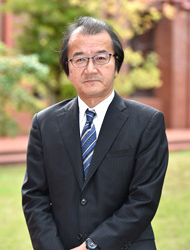Ryukoku University You, Unlimited
Need Help?
Graduate School of Economics
Message from the Dean
Aiming for Practical Research of Economics to Solve Issues confronting All humankind

Today, one of the world’s most pressing issues is to advance measures to curb global warming. The Earth’s temperature rise is mainly attributable to human activities. The residual carbon dioxide (CO2) emitted by human activities after absorption by natural ecosystems, including forests and oceans, accumulates in the atmosphere.
In Ryori, Ofunato City, Iwate Prefecture, the Japan Meteorological Agency has established a station to observe the atmospheric concentration of CO2. The annual average concentration in 1987, the first year of the observation, was 351.4 ppm, rising to 419.5 ppm in 2021, and continually breaking the record.
To reduce global warming, we must stop increasing CO2 levels by striving to prevent CO2 emissions from exceeding the amount of CO2 absorbed by various sinks. It is important to build up a socio-economic system that can realize net zero emissions.
When considering measures to address climate change, we cannot simply bypass the issue of how to allocate emissions to countries around the world. Most people in developing countries are significantly vulnerable to adverse effects caused by global warming. Negative impacts, including sea levels rise, typhoons, floods, droughts and infectious diseases, particularly impact poor people in developing countries. These people live in places prone to harmful influences exerted by global warming while relying on agriculture, forestry and fishery: in other words, industries highly sensitive to natural environments. Natural disasters have been increasing the number of people who lose their homes and are forced to move. Global warming issues are closely related to global poverty issues. Therefore, it is essential to examine these two types of issues comprehensively.
The educational philosophy of Ryukoku University’s Graduate School of Economics is to contribute to peace and sustainable development on the basis of dialogue and coexistence both in the world and in local communities. Under this philosophy, the Graduate School of Economics established its Master’s Degree Program in 1982 and its Doctoral Degree Program in 1985.
The Master’s Degree Program aims to develop human resources, including researchers who can build creative theories and conduct applied analysis with a deep understanding of the world, and professionals with excellent practical abilities backed by their lofty ideals and knowledge of economics.
The Doctoral Degree Program is geared toward fostering specialists who can achieve world-class creative research, with the objective of cultivating profound academic knowledge that forms the foundation for the advanced research skills required to allow researchers to pursue their own research independently.
The Master’s Degree Program offers the three programs shown below, helping graduate students develop and improve their research abilities through the provision of curricula tailored to each area of specialization.
1) Comprehensive Economics Program
By comprehensively learning theories, policies and the history of economics, students will acquire skills in both economic analysis and policy making. This program aims to develop human resources who will play a leading role in research institutes, public agencies and industrial communities.
2) Graduate Program of Asian and African Studies
This is a master’s degree program for study of the Asian and African regions. Operated jointly by the Graduate Schools of Economics, Law, and International Studies, this program allows students to enhance their interdisciplinary research abilities.
3) English-based Degree Program
From the second semester of 2020, a new standing program is now available for international students who receive a scholarship from the Japanese Government or the Japan International Cooperation Agency (JICA). Students can complete their master’s degree program by taking lectures and seminars only in English.
At the Graduate School of Economics, faculty members will use their accumulation of research and abundance of practical experience in their own fields to tackle various issues together with the graduate students, and give their utmost to achieve innovative and creative research. We heartily welcome both Japanese and international students with the ambition to join this exciting operation.
Hironori Date
Dean, Graduate School of Economics